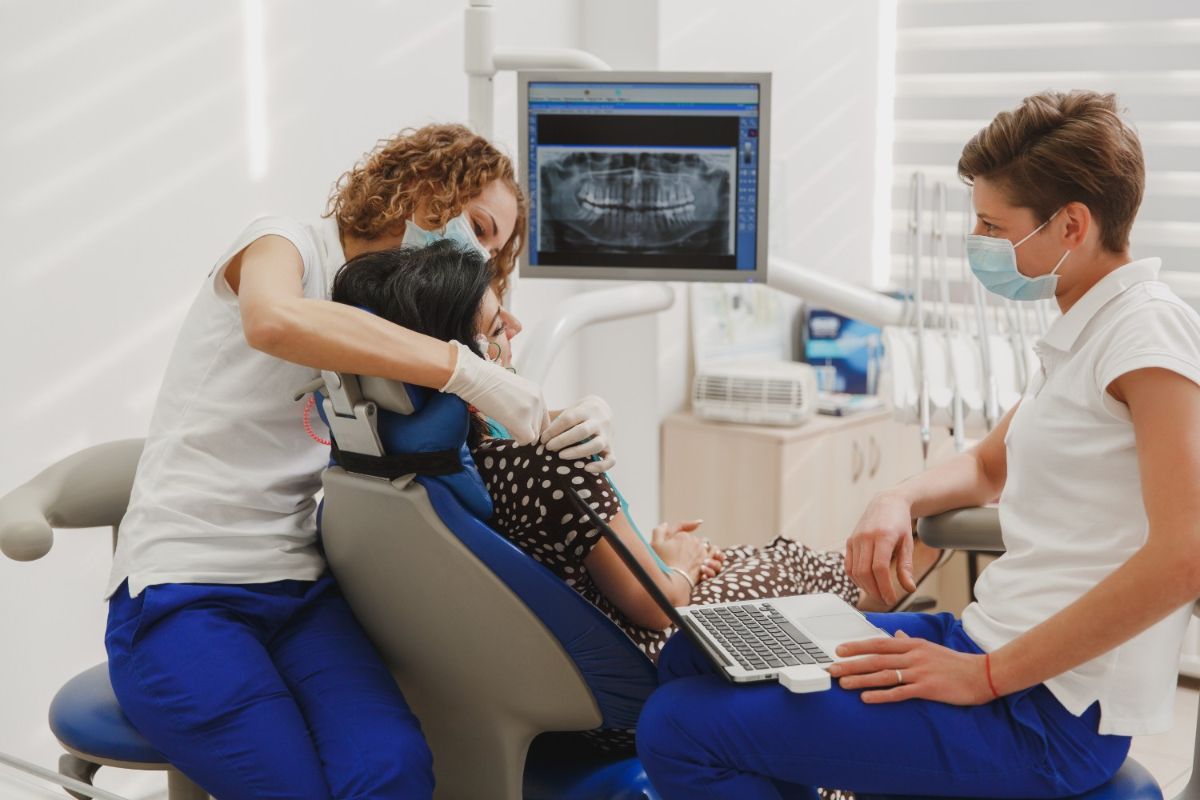Are you one of the millions of Americans who dread the thought of sitting in a dental chair? Dental anxiety is incredibly common, with as many as half of all US adults admitting to some level of fear when it comes to visiting the dentist—and that’s before we even talk about children! This deep apprehension is one of the main reasons people avoid regular dental visits.
These check-ups are an essential part of maintaining a healthy mouth, however, and this can lead to something we call “the cycle of avoidance.” Someone avoids dental care until an emergency happens, which will often require invasive treatment to correct. This only reinforces their original fear and leads to further procrastination around preventive care. But it doesn’t have to be this way!
First Class Smiles is proud to offer sedation dentistry to patients who are suffering from any level of dental anxiety. If you’ve ever put off work you know you need or avoided regular check ups throughout the year, sedation could be an excellent option for you! Whether you’re coming in for a routine cleaning or need more extensive work done, you’ll feel less fearful and more confident in our care. Keep reading to learn how sedation dentistry can help you relax in the chair for a smile that looks great and feels good, too!

What is sedation dentistry?
Sedation dentistry can take the stress out of dental visits, offering nervous patients a more comfortable and positive experience overall. Through the use of different types of medication, our team is able to help patients who:
- are nervous at the thought of needles or dental treatment in general
- are uncomfortable with the sights, sounds, tastes, and smells that can be associated with a dental office
- have sensitive teeth and gums
- have difficulty achieving numbness
- have a sensitive gag reflex
- are anxious about extensive dental work
Sedation makes treatment safer by preventing spontaneous movement, and it can also help patients forget many details of their procedure. This is beneficial, as patients learn that they don’t need to be fearful or anxious about future appointments. Sedation can be especially useful if several procedures need to be done at the same time, allowing even complex treatment to be handled in fewer visits.
What types of sedation are available at First Class Smiles?
We have several different types of sedation available, each with its own specific benefits. Your doctor will take your medical history and comfort level into consideration before recommending a particular kind of treatment, along with the type and duration of the procedure. We offer the following sedation options in our Des Plaines office.
Inhalation sedation
Commonly referred to as “laughing gas” before, the technical term for this type of sedation is nitrous oxide. This sedative is frequently used, and mild enough that it can be safely administered to patients of all ages. We do this by placing a fitted mask carrying a mix of oxygen and nitrous over the nose. As the patient breathes in normally, uptake occurs through the lungs. While the sedation takes effect in about five minutes, the patient will remain conscious throughout the procedure.
The mask will remain in place until the treatment is complete. The nitrous will then be turned off and the patient will breathe in pure oxygen for a few minutes to clear out any remaining gas. Most patients experience no lingering effects, but nitrous oxide can occasionally cause a bit of mild nausea. For this reason, we suggest only minimal food intake before the procedure. Patients receiving nitrous oxide will generally have no problem driving themselves home.
Oral sedatives
Oral sedatives are another method used to reduce dental anxiety, and come in either pill or liquid form. Anti-anxiety medications such as Valium and Halcion bind with the receptors in the brain that are responsible for fear and help the patient relax. Depending on the dosage and type of medication, most patients will experience a sense of calm and drowsiness within about twenty minutes.
We’ll usually monitor patients for about half an hour after their procedure. Minor amnesia and a tingling sensation are common side effects, and may last for 4-6 hours or so. If you are scheduled for a procedure where oral sedatives will be used, you should avoid eating and drinking after midnight on the day of your appointment. Due to the lasting effects of oral sedation, these patients will also need someone to drive them home after their appointment is complete.
IV sedation
Intravenous sedation is sometimes also referred to as “sleep” dentistry. This is because patients who undergo IV sedation fall into a deep state of relaxation and may have only a partial memory from the procedure, or sometimes none at all. IV sedation is safely administered by a professional who will closely monitor a patient’s vital signs, and can be a good choice for those who have:
- a true dental phobia
- complex medical histories
- major dental treatment scheduled
- physical, psychological, or emotional special needs
After the procedure, patients won’t be able to drive and will need a friend or family member to take them home. It will be necessary to relax for the rest of the day following IV sedation.

Leave fear behind with sedation dentistry from First Class Smiles
Sedation dentistry is a wonderful way to control the fears and anxiety related to dental appointments. You’ll be able to completely relax during your dental visit, and many complex procedures can be accomplished in a single visit. This can allow you to catch up on years of putting off regular dental checkups! Sedation also simplifies treatment by reducing your gag reflex and provides extra comfort and rest.
The expert team here at First Class Smiles is trained to be sensitive to dental phobias, and we’ll do everything we can to make your dental experience physically and emotionally comfortable! Our sedation options can play an important role in that. Whatever the root cause of your dental anxiety, you’ll be treated with understanding, respect, and compassion. To find out if you’re a good fit for sedation dentistry, get in touch with us today to schedule a sedation consultation!

